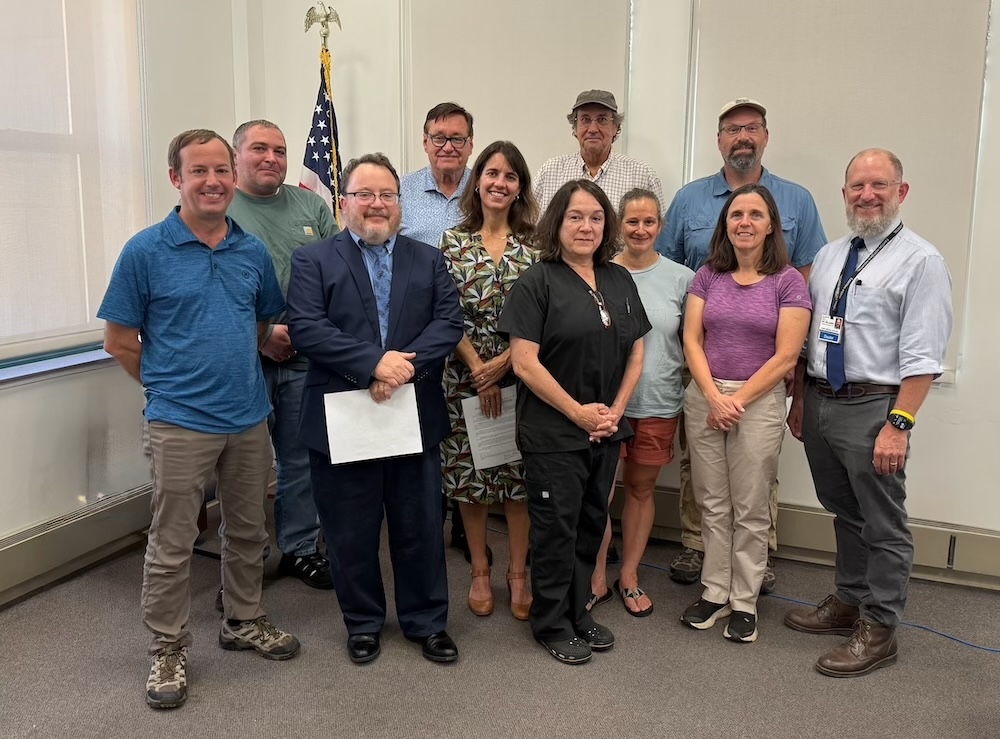Recent Headlines

Protecting public health. Pictured, from left, Mark Deavers, St. Lawrence Board of Health (BOH); Dr. Gregory Healy, BOH; Dr. Glenn Johnson, SUNY Potsdam; Dr. Robert Snyder, SUNY Potsdam. Front row, from left t: Dr. Brian Leydet, ESF; Dr. Tom Langen, Clarkson University; Dr. Katherine Cleary, SUNY Potsdam; Rita Curran, NP, (Hon.) BOH and county legislator; Dr. Jessica Scillieri-Smith, BOH; Dr. Kathleen Terrence, BOH vice president, and Dr. Andrew Williams, BOH president.
Fighting Mosquito-Borne Disease: ESF Professor, Students Join Statewide Effort to Protect Public Health
St. Lawrence County Recognizes ESF’s Leadership in Launching their first Mosquito Surveillance Program
SYRACUSE, N.Y. – Oct. 02, 2025 — Scientists and students from the SUNY College of Environmental Science and Forestry (ESF) played a leading role in establishing a mosquito monitoring program in St. Lawrence County, the first of its kind in the region, to combat mosquito-borne disease and protect public health.
In 2024, St. Lawrence County experienced fatal horse cases of Eastern equine encephalitis virus (EEEV), a rare but serious and often fatal infection that causes inflammation of the brain. Spread by infected mosquitos, EEEV can also infect mammals, birds, reptiles, and amphibians.
Low vaccination rates among horses contributed to the outbreak. This led New York state to declare a state of public emergency which opens funding avenues for mosquito surveillance. Despite the urgency, most counties, including St. Lawrence, lack the infrastructure and budget to conduct regular mosquito monitoring. That’s when ESF alumna and Deputy Director of Public Health Carly Zimmerman reached out to ESF for help.
Dr. Brian Leydet, an ESF professor specializing in mosquito- and tick-borne diseases, was a key player in the collaborative, partnering with students and faculty from SUNY Potsdam, Clarkson University, and Cornell University. Together, they designed the surveillance program from scratch in fall 2024.
“They needed personnel power, technical guidance, and the know-how to get started,” said Leydet. “I always love working with public health practitioners because the science we do should reach the public—and this kind of work makes that happen.”
The team deployed three types of mosquito traps—CDC Light Traps, Gravid Traps, and Resting Boxes—and trained students to collect, identify, and send mosquito samples to the Wadsworth Center in Albany for virus testing.
Among the student researchers was Melia Kanaowicz, a senior environmental biology major at ESF. Her internship was funded through a competitive Fink Career Fellowship, which supported her work in St. Lawrence County. When housing became a challenge, Dr. Mariann Johnston, director of ESF’s Ranger School, stepped in to offer accommodations in Wanakena.
Kanaowicz not only contributed to county-wide surveillance but also conducted her own research project at the Ranger School, identifying the mosquito species Culex erraticus, previously undocumented in this area of New York state. Her work will form the basis of her honors thesis and is being developed into a scientific paper in collaboration with a master’s student in the Leydet Lab.
“This was my first season of proper field work,” said Kanaowicz. “It was incredibly rewarding to help build a program from the ground up that will continue to benefit public health in the county.”
Another ESF student, Rachel Hewey, joined the project through her internship with Cornell’s Northeastern Center for Excellence in Vector-Borne Diseases. A sophomore environmental science major, Hewey wanted hands-on experience in both lab and field settings—and found it close to home as a resident of St. Lawrence County.
“I knew this opportunity would help me build skills and contribute to research in my hometown,” she said.
During the 2025 surveillance season, more than 6,000 mosquitoes were tested for 10 viruses, including EEE and West Nile. The detection of West Nile virus triggered real-time public health alerts. No human or horse cases of EEE were reported during the same period.
With the program’s success, the St. Lawrence County Health Department is now budgeting to continue mosquito surveillance, with plans for more student engagement, data collection, and publications.
“This work shows ESF’s connection beyond the college’s borders—not just to our students but to the state,” said Leydet. “There’s a visible link between science, ESF, and public health. Mosquitoes and ticks bring climate change to your backyard.”
In recognition of their efforts, Drs. Leydet and Johnston, along with their collaborators from SUNY Potsdam, and the St. Lawrence Department of Health, were honored by the St. Lawrence County Board of Legislators in September. The resolution praised their work for strengthening ties between public health and higher education, and for fostering community-based public health initiatives.
“ESF fulfills its mission to ‘Improve Our World’ through projects like the partnership with St. Lawrence County,” said ESF President Joanie Mahoney. “Our faculty and students bring science in service to people, often volunteering their time, working with public health teams, and making a real difference.”
About SUNY ESF
The SUNY College of Environmental Science and Forestry (ESF) is dedicated to the study of the environment, developing renewable technologies, and building a sustainable and resilient future through design, policy, and management of the environment and natural resources. Members of the College community share a passion for protecting the health of the planet and a deep commitment to the rigorous application of science to improve the way humans interact with the world. The College offers academic programs ranging from the associate of applied science to the Doctor of Philosophy. ESF students live, study and do research on the main campus in Syracuse, N.Y., and on 25,000 acres of field stations in a variety of ecosystems across the state.
About the Ranger School
The Ranger School in Wanakena, New York, offers students a unique educational experience in a spectacular natural setting. The Ranger School confers the associate in applied science degree (A.A.S.) in three areas of study: forest technology, land surveying technology, and environmental and natural resources conservation. The Ranger School's one-plus-one plan allows students to complete their first year at the college of their choice, then spend their second year at The Ranger School.